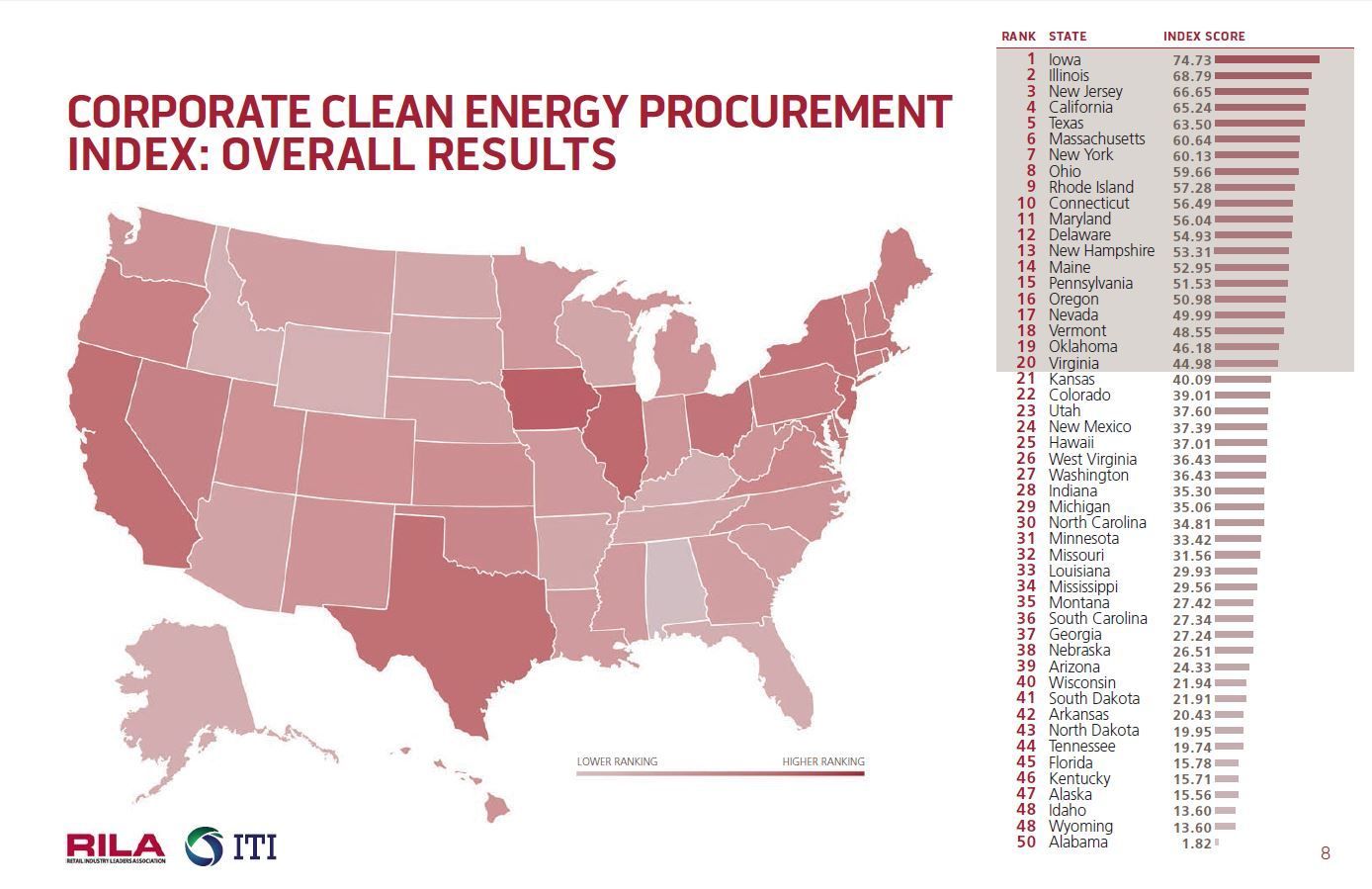

By John Rogers
If you’re a company looking to get your hands on some renewable energy, to power your operations with sources like wind and solar, turns out some states make that a lot easier than others. Here’s what a new study says about different options for businesses interested in going clean, energy-wise.
The new study, Corporate clean energy procurement index: State leadership and rankings, offers an array of useful perspectives. It comes from the Retail Industry Leaders Association (RILA), the Information Technology Industry Council (ITI) and Clean Edge, the research and advisory firm behind various useful rankings of clean energy progress.
The analysis is aimed at assessing states “based upon the ease with which companies can procure [renewable energy] for their operations located within each state.” The index has 15 metrics in three categories: purchasing from utilities, purchasing from third parties (someone other than your electric utility) and using “Onsite/Direct Deployment Options”—putting solar or wind right on your stores, factories and warehouses.
And here’s what they found:
The top states are all over the map, literally—from #1 Iowa and #2 Illinois in the middle of the country, to New Jersey, California and Texas.
As the top performers show, no one region has a lock on making corporate renewables purchases easy. But the authors note that some regions do better:
The Northeast, Midwest and Mid-Atlantic regions are generally the most favorable regions in the U.S. for corporate customers seeking to power their operations with renewable energy…
Let Businesses Capture the Economic Development Benefits of Renewables … or Not
The analysis assesses how much choice and competition for renewable energy purchases exist by state. One indicator of that is whether companies are allowed to enter into PPAs (power purchase agreements) with third parties, which let companies take advantage of the stable prices renewables are uniquely qualified to offer, to lock in electricity rates over the long term.
The answer is yes, no, or maybe:
As a taste of some of the corporate procurements, the report includes examples of large-scale purchases by some pretty big names:
Broadening the Pie
The authors don’t stop at assessing where we are, but suggest opportunities for a cleaner future. In particular, to help businesses trying to get access to renewable energy, they say, here are a few ideas for what states can do:
1. “Remove barriers to corporate deployment” of renewables, both onsite and elsewhere.
2. “Support the development of next-generation options” for helping corporate buyers use renewables to save money or hedge against swings in electricity costs.
3. “Expand energy choice options” for commercial and industrial customers in markets that haven’t “restructured,” ones in which electric utilities still own power plants, not just the electric distribution systems.
4. “Ensure that an adequate market exists for renewable purchasing” through utilities or others.
5. Ensure that, in any type of market, renewables “can scale up rapidly.”
And, as the report says, while it’s focused on helping the businesses that are members of RILA and ITI in cleaning up their own acts, its findings are also “broadly applicable to many stakeholders, including other business sectors, the military, higher education and state and local government.”
Businesses seeing the power and value of renewable energy have been important drivers for our transition to energy choices that cut air and water pollution, improve public health, strengthen energy security and drive economic development.
https://twitter.com/EcoWatch/status/812466596518199296
States can make it easier for leading businesses to play that important role, or not. Clearly many states see the value in making it as easy as possible to get businesses of all stripes and sizes to help us move to clean energy. This new report gives us a chance to see which states those are, and to celebrate them.
John Rogers is a senior energy analyst with expertise in renewable energy and energy efficiency technologies and policies.

 233k
233k  41k
41k  Subscribe
Subscribe 


